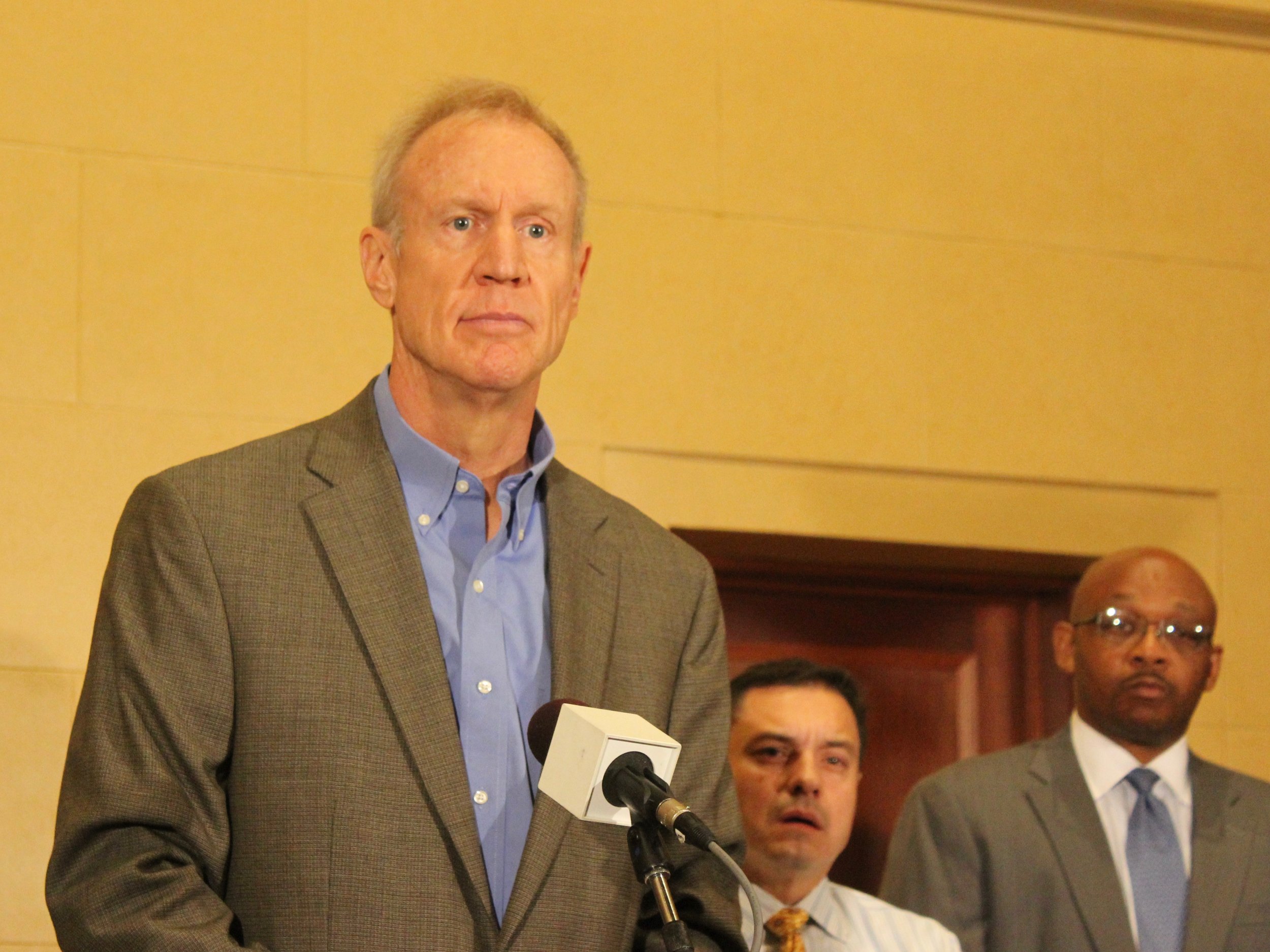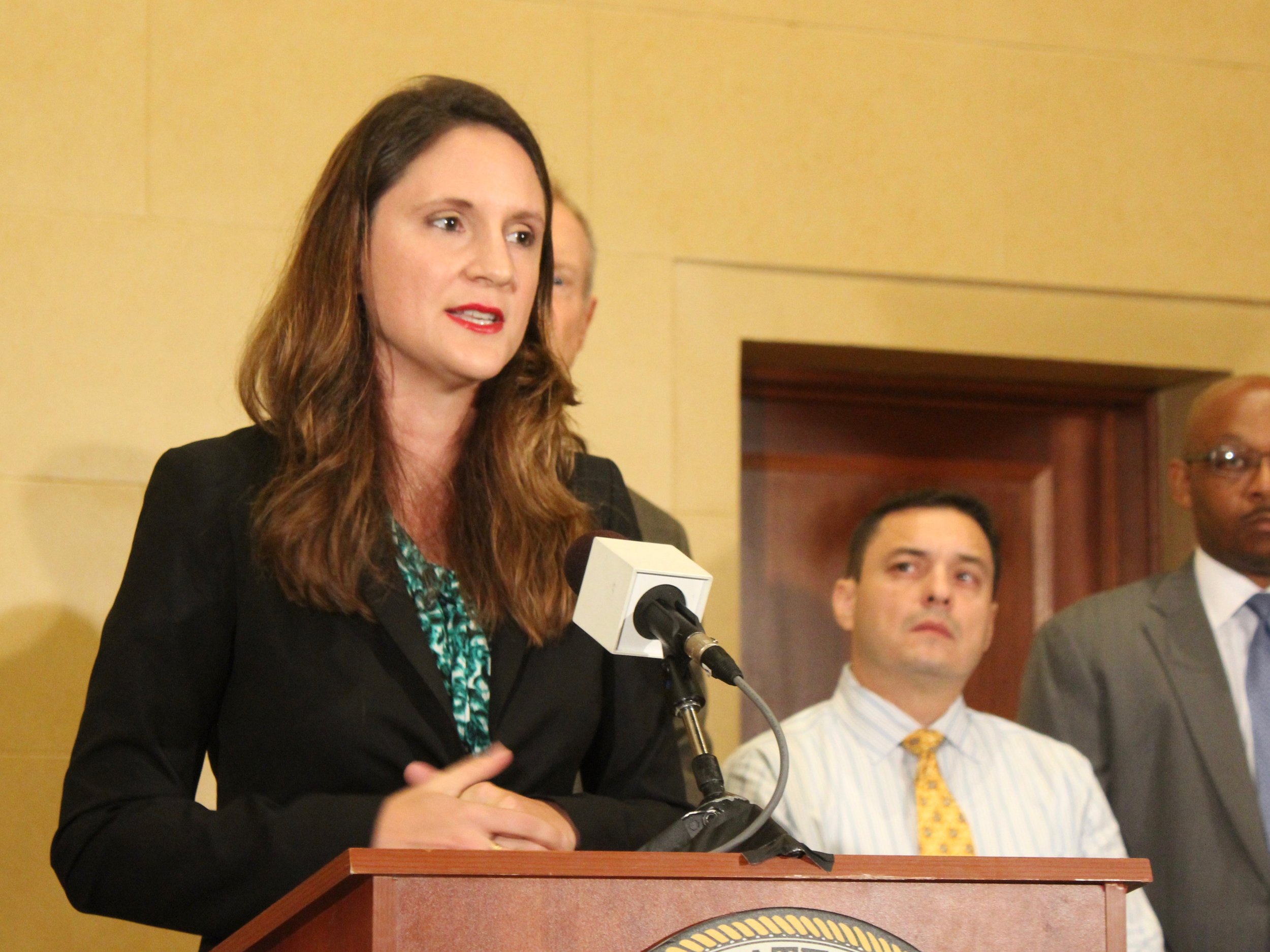Rauner pledges VW settlement to improve air quality
The first $20 million will go to Chicago mass transit, but electric school buses and statewide grants will follow
Gov. Rauner announces plans to spend part of a $108 million Volkswagen settlement on upgrading and replacing diesel engines in mass transit. (One Illinois/Ted Cox)
By Ted Cox
Gov. Bruce Rauner and his Environmental Protection Agency chief on Wednesday touted the gains to be had from investing a windfall from a Volkswagen settlement into electrifying public transit.
In an announcement at Union Station in Chicago, Rauner said the first $20 million installment of a $108 million VW settlement would go toward grants to "improve air quality in Chicago" and work toward getting "all highly emitting vehicles out of use."
Rauner insisted, "The benefits from these grants will be statewide."
Illinois EPA Director Alec Messina added that the first $20 million was going to government-owned commuter rail and public-transit bus projects in the Chicago area, because it has the highest population and most extensive mass-transit networks in the state, but that subsequent funding rounds will go to the Metro-East St. Louis area along with Champaign, DeKalb, LaSalle, McLean, Peoria, Sangamon, and Winnebago counties.
"Commuter rail projects will remove some of the oldest, dirtiest diesel engines in Illinois from service,” Messina said. “Funding replacement of transit buses will promote all-electric and alternate-fuel technology, and funding for electric school buses will protect the public health of some of our most vulnerable Illinoisans."
Jen Walling, executive director of the Illinois Environmental Council, applauded the $1 million designated for electric school buses and the $9 million expected to soon follow, saying that students would feel the impact. "Their lung health is being damaged every day," Walling said.
"Their lung health is being damaged every day."
Jen Walling of the Illinois Environmental Council on students riding diesel school buses
She also cheered the initial investment in upgrading mass transit, saying it was "kick-starting electrification of our public transportation system."
The $108 million to be paid by VW and spent by the state over the next 10 years is Illinois's share of a $15 billion U.S. court settlement that Rauner said was for "unethical behavior" that "falsified emission reports on diesel engines." As such, the state will spend its share on upgrading or replacing diesel engines in trucks, tugboats, and locomotives, what Rauner called "quite large, quite old high emitters" of diesel fumes, especially in areas that most felt the impact of VW's diesel engines. Rauner called it "turning bad behavior into a good thing."
The Better Government Association touted that it compelled the Rauner administration to seek public feedback on the VW settlement and open spending to other reforms, such as increasing the number of charging stations for electric cars, after the administration originally "had earmarked much of the cash for diesel-engine makers."
On Wednesday, Rauner and Messina mentioned electric-car charging stations, but said the balance of the state's $108 million settlement would be thrown open to grants sought through a state Notice of Funding Opportunity, with the first round of applications due Oct. 15. According to Messina, applications will be weighed according to criteria like cost-effectiveness and ultimate environmental impact, especially in targeted areas.
Benjamin Brockschmidt, of the Illinois Chamber of Commerce, said, "The right balance has been struck today," between environmental concerns and the impact on business.
Messina was asked how plans for the VW settlement jibed with the state EPA's support for relaxed emission standards for Dynegy Midwest Generation's coal-burning power plants and with Rauner's stated support for coal. He insisted that was a tradeoff exchanging measurements on the rate of air pollution for a mass measurement of overall air pollution, and that would eventually lead to less pollution.
Walling, however, wasn't buying that explanation. "It is something that will allow them to close plants that still pollute more, and in fact incentivizes them to close some of their cleanest plants in Illinois," she said. "I appreciate that through their technical analysis they think they're getting to the right result with Dynegy, but from our review it's going to be something that really helps them out and will allow more emissions."
Walling said she expects the public to exert an impact on both spending plans for the VW settlement and on the relaxed coal-plant emission standards.


